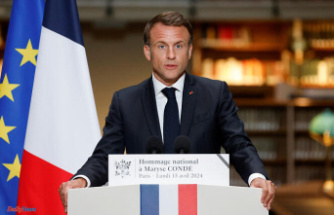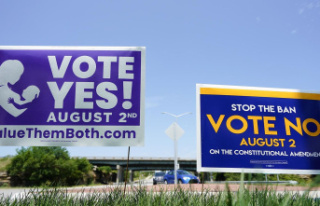Amid threats and harsh criticism from China, US House Speaker Nancy Pelosi continued her visit to Taiwan on Wednesday with talks in parliament and a meeting with President Tsai Ing-wen. Pelosi Taiwan assured the support of the USA.
She and her delegation traveled to Taiwan "to make it absolutely clear that we will not give up our commitment to Taiwan," said the 82-year-old at a press conference with Tsai in the capital, Taipei. The visit is also a sign "that we are proud of our enduring friendship".
Referring to Beijing's communist leadership's threats against Taiwan, Pelosi declared, "More than ever, American solidarity is crucial." That is the message of the visit of their congress delegation. US support for Taiwan is bipartisan. "Today the world faces a choice between democracy and autocracy," Pelosi said, praising Taiwan as "one of the freest societies in the world."
Taiwan's president said Russia's invasion of Ukraine drew international attention to the conflict with China over Taiwan. The situation in the Taiwan Strait has implications for security in the Asia-Pacific region. "Taiwan will not back down," Tsai said, referring to the threat posed by China. "We will do whatever is necessary to strengthen our self-defense capabilities" and hold "democracy's line of defense".
Despite all the threats from Beijing, Pelosi, who is a member of US President Joe Biden's Democrats, traveled to the island's democratic republic on Tuesday for the highest-ranking visit from the US in a quarter of a century. Beijing sees Taiwan only as part of the People's Republic, strictly rejects official contacts from other countries to Taipei and had vehemently warned the USA against a trip to Taiwan by the top politician. In response, China's People's Liberation Army immediately launched maneuvers in six sea areas surrounding Taiwan. There should also be “extensive shooting practice” until Sunday.
In Japan, the maneuvers raised concerns. The maneuver area near Taiwan overlaps with Japan's exclusive economic zone, government spokesman Hirokazu Matsuno said, according to the Kyodo news agency. Concerns have been communicated to Beijing. Japan is a key US ally.
China's maneuvers are considered the greatest military muscle flexing since the 1995 missile crisis, when China fired missiles over Taiwan to intimidate it and the US deployed two aircraft carrier groups. The sea areas for the exercises go well beyond the restricted zones at the time, reach close to Taiwan and sometimes appear to be encroaching on its sovereign territories. Experts also expect that shipping routes could be affected.
On Tuesday alone, Beijing sent 21 planes into Taiwan's Air Surveillance Zone (ADIZ), the Defense Ministry in Taipei reported. These provocations have recently increased sharply, but the high number is unusual. It was about fighter jets and aircraft for air surveillance or electronic warfare.
The State Department in Beijing on Wednesday also summoned the US Ambassador to Beijing, Nicolas Burns, to protest against Pelosi's visit. Vice Foreign Minister Xie Feng spoke of a "serious provocation and a violation of the one China principle," state media reported.
Pelosi had previously spoken to Legislative Council Vice Chairman Tsai Chi-chang and other MPs in the Taipei Parliament. The 82-year-old also wanted to meet human rights activists before flying on to Seoul at 5 p.m. local time (11 a.m. CEST) with a congressional delegation as part of her Asia trip.
Washington expects longer-term reactions from China in response to Pelosis Taiwan trip. The communications director of the National Security Council, John Kirby, expects military maneuvers or economic measures. So far, however, China's reaction has been fully in line with what the US government had expected and predicted.
Kirby stressed that the US did not want a crisis and would not engage in saber-rattling. The US government is prepared to deal with anything. Referring to Pelosi, Kirby said US President Joe Biden respected her decision to visit Taiwan. Your visit will not change the United States' one-China policy. According to this, Beijing is regarded as China's only legitimate government, but the USA does not take a position on the status of Taiwan.
The visit also triggered a debate in Germany. The CDU foreign politician Norbert Röttgen thinks the timing is wrong. "Due to the Russian war of aggression, there is currently more than enough international tension." The visit is purely symbolic, "which China in turn feels unavoidably provoked," he told the editorial network Germany (RND). However, China's threatening gestures are unacceptable.
On the other hand, the chairman of the Foreign Affairs Committee, Michael Roth (SPD), told the newspapers of the Bayern media group: "This visit is neither aggressive nor provocative." The foreign policy spokesman for the FDP parliamentary group, Ulrich Lechte, welcomed the fact that Pelosi had not been impressed by Beijing's attempts at intimidation.
The foreign policy spokesman for the Union faction, Jürgen Hardt, also praised the trip. "We cannot avoid conflict with China over key issues," he told the media group. The left-wing politician Gregor Gysi told the news portal "Watson" that provocations should be avoided. China will leave Taiwan alone as long as it sees no threat to the one-China policy.












